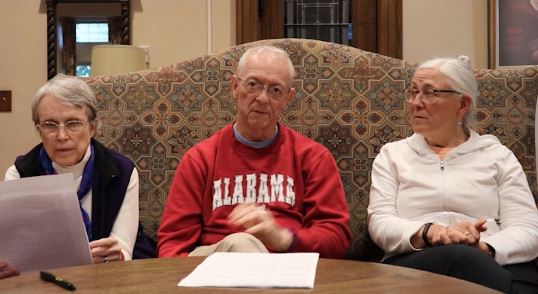Progress Report: The Pam Byers Memorial Collecting Initiative

In September 2018, I was hired as the Pam Byers Memorial Fund Project Archivist to work full-time on collecting and making accessible the history of the movement for LGBTQIA+ inclusion in the Presbyterian Church U.S.A. Thanks to the generosity of donors and the willingness of Presbyterians to participate in this project, PHS has been able to add a substantial amount of material to our collections that document LGBTQIA+ history from the late 1960s until today.
New Collections
So far 11 collections have been processed and the guides are now accessible on the Pam Byers Memorial Fund webpage.
One of the first collections processed was the Patricia Dykers Koenig Papers. Patricia worked as the national organizer of the Covenant Network for sixteen years. Her personal papers include correspondence, overture drafts, and videocassettes that document the work of More Light Presbyterians and the Covenant Network beginning in the early 1990s.
Two other processed collections, the Jerry Andrews Papers and the Jack Haberer Papers, include materials related to the Presbyterian Coalition and the organization’s campaigns to maintain ordination standards in the PC(USA).
Barry Smith, the historian at Lincoln Park Presbyterian Church, recently donated the David Sindt Papers. Barry Smith diligently processed and wrote an index to the papers that include his own recollections of David Sindt and the history of the movement for an inclusive church. The papers contain correspondence, newsletters, and ephemera from Sindt’s early work to organize the Presbyterian Gay Caucus, an organization that continues its work today as More Light Presbyterians. Also included are photographs and correspondence from Barry Smith and Lincoln Park Presbyterian Church’s advocacy for LGBTQIA+ rights.
Five additional collections have been accessioned, including the papers of David Colby, who chaired the Covenant Network’s Strategy and Local Organizing Committee during the ratification campaigns for ordination and marriage, and the papers of Greg Partridge who edited the newsletter for That All May Freely Serve.
Oral Histories
PHS completed 28 oral histories in 2019. This included taking trips to Minneapolis to interview members of the Covenant Network and More Light Presbyterians.
In Rochester, NY, we interviewed members of Downtown United Presbyterian Church, Third Presbyterian Church, and That All May Freely Serve.
PHS also traveled to New York City this November to interview four pastors: Bertram Johnson, Eric Thomas, Ashley DeTar-Birt, and Chris Shelton.
Thank you to everyone who shared their stories with us and/or helped connect us with others to interview. More oral histories are accessible online, in our digital archive Pearl. There will be additional interviews uploaded throughout 2020.
LGBTQIA+ History Online
The LGBTQIA+ History page in Pearl includes more than oral histories. There are 84 items total, including a study packet created by the 1978 United Presbyterian Church in the U.S.A. Task Force to Study Homosexuality.
Also digitized is the very first newsletter published by That All May Freely Serve, which includes a column written by Janie Spahr titled “News and Views from Your Lesbian Evangelist.”
Another item that was digitized is the July/August 1973 issue of Trends. The issue focused on homosexuality within the church during a time when gay and lesbian rights were rarely discussed.
There are more booklets, photographs, videos, and correspondence available within the digital collection. Click here to explore.
Also available online is a timeline of LGBTQIA+ History in the PC(USA), 1970-2019 which PHS is editing and updating as we gather more information. Please email PHS if you see any corrections or additions that should be made.
What’s Next?
Thank you to the donors who made all this work possible. We plan to continue to collect oral histories and records that document as many aspects to this history as possible.
To do this, PHS will spend the next year prioritizing the interviewing of queer people of color and people who identify as bisexual, trans, or non-binary. We hope to archive stories from all of those involved in the movement for LGBTQIA+ inclusion across the theological spectrum, and at the same time recognize the importance of inviting those who have been the most overlooked throughout the history of the movement to contribute.
Please contact us if you would like to participate in this project. Additionally, you can support the project financially.




























